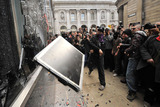
2009-12-08
Court heard Mindaugus Lenartavicius made repeated attempts to set blinds at Royal Bank of Scotland in City ablaze after fellow demonstrator had smashed windows
A demonstrator at the G20 summit who tried to burn down a bank in the City of London at the height of clashes with police was today jailed for two years.
Mindaugus Lenartavicius, a Lithuanian, repeatedly attempted to set light to blinds at the Royal Bank of Scotland after a fellow protester had smashed windows.
CCTV footage showed Lenartavicius, hooded and wearing a balaclava, stepping back after each attempt to see whether the flames had caught.

Each time they failed to take hold, he stepped forward and tried to set fire to the blinds again.
Southwark crown court, in London, heard that, after he finally succeeded, smoke was "billowing" from the building, near the Bank of England in Threadneedle Street.
Charlotte Welsh, prosecuting, said his efforts resulted in nothing more than singed blinds and "scorching" to the ceiling.
The barrister added that despite attempts by Lenartavicius to conceal his identity, police relayed details of his distinctive studded hood to other officers and he was arrested a short time later.
He was searched, and a lighter and balaclava were found in his pocket.
The 22-year-old, who had been staying in a squat on the North Circular Road in Palmers Green, north London, admitted one count of arson on 1 April this year.
He was formally cleared at an earlier hearing of a similar charge accusing him of "being reckless as to whether life was endangered".
Sentencing, Judge Geoffrey Rivlin QC said: "There is no doubt you helped to turn a peaceful protest into a violent and angry protest.
"Arson is always a serious matter, and this offence was committed in the full glare of massive publicity."
Because Lenartavicius's sentence is more than 12 months, he faces automatic deportation.
Welsh told the court the defendant had arrived from Lithuania days before the G20 protest and had planned to return immediately afterwards.
Oliver Wellings, defending, insisted his client was a "pacifist" and had not gone to the protest to cause trouble.
"His beliefs and his convictions were sincere, and at the outset it was a peaceful protest," he said.
However, he was "swept away by the power of the mob, buy the power of the crowd and, perhaps, the glare of publicity. He suffered a momentary loss of control".."
He said it was "not his intent to endanger life nor, indeed, did he believe danger would be caused," Wellings said.